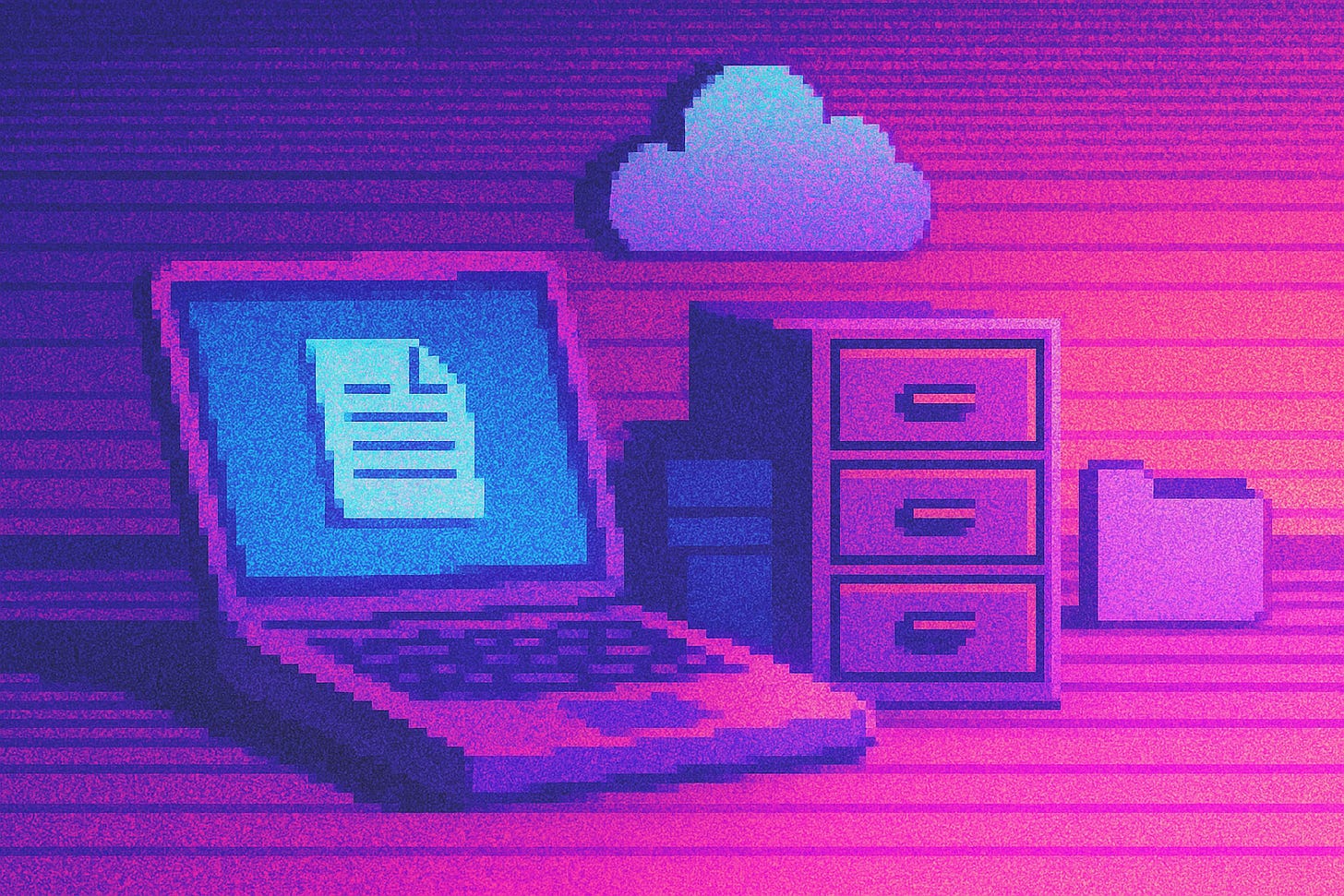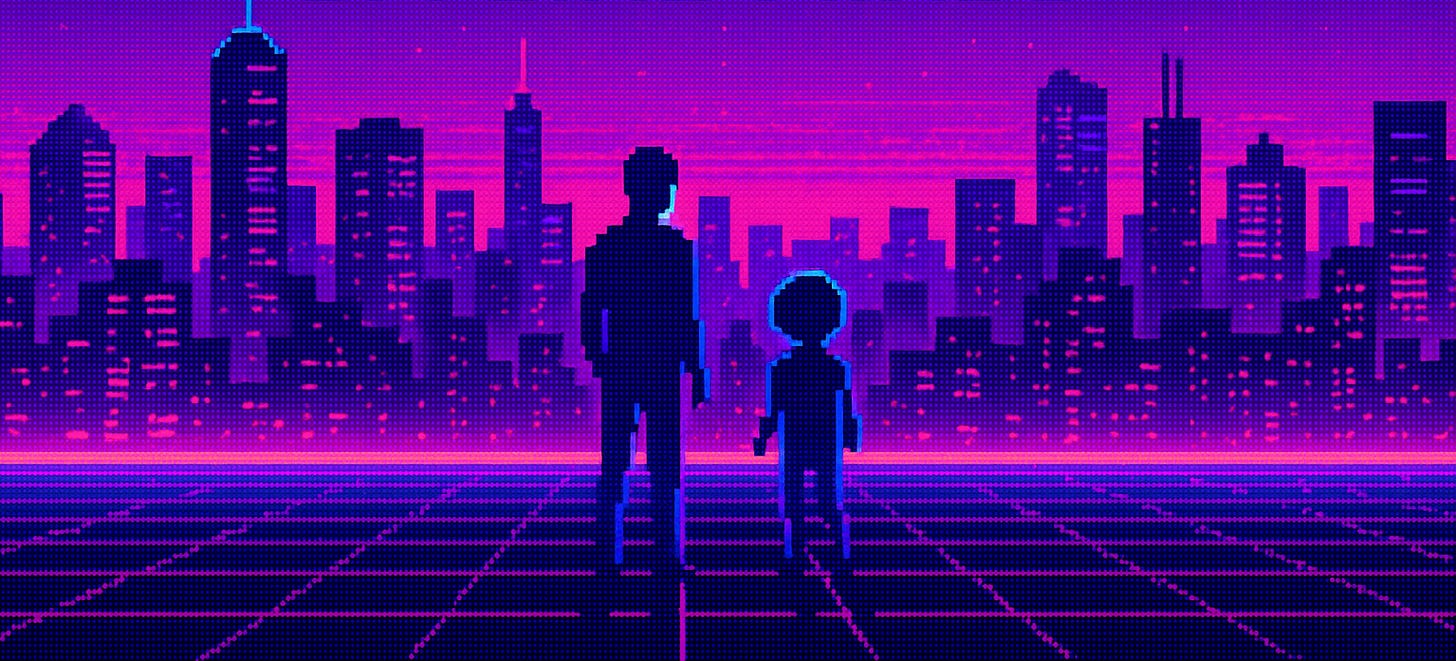Offline Intelligence
Intelligence is personal. The future belongs to models that stay close to the source.
Most of the world’s data isn’t online. It isn’t floating around in public datasets or sitting inside some massive cloud index. It lives on laptops, in company drives, inside forgotten Slack threads, and in messages that never touch an API. The world’s true intelligence is buried in the day-to-day noise of work, inside drafts, spreadsheets, and half-finished thoughts that no one outside the room will ever see.
That is where meaning lives. The raw, unfiltered context of how people actually think, decide, and build. Every version of a document, every revision in a note, every quiet message between coworkers is a trace of cognition. It’s what defines human intelligence: messy, iterative, and private.
The problem is that AI doesn’t see any of it. Today’s models are trained on what’s public. They learn from what people publish. It produces intelligence that sounds human but doesn’t understand humanity.
The truth is that the cloud doesn’t hold the world’s knowledge. People do. Every device, every local drive, every personal workflow holds more meaning than a trillion scraped web pages. The next generation of AI won’t find intelligence online. It will find it offline, hidden in the spaces where real work happens.
What Cloud AI Got Wrong
The cloud turned intelligence into a rental service. You do not own it. You borrow it for a few seconds at a time. Every prompt you write is shipped across the internet to a model that has no idea who you are. It forgets your request the moment it responds. It learns nothing from the exchange.
This is impressive engineering, but it is not real thinking. These models were trained for throughput, not understanding. They learned to predict the most likely continuation of text across billions of documents. They did not learn how meaning forms in the mind of an individual. The internet scraped dataset is a flattened map of human expression. Everything distinct is averaged. Everything messy is removed. Every voice is pulled toward the center.
So we got systems that summarize well, imitate well, and speak confidently, but they cannot genuinely understand anyone. They only recognize the most common patterns, the safest statistical pathways. They respond with what is typical, not what is true for you.
Real intelligence does not come from an aggregation of humanity. It comes from the specific. It comes from the outliers, the contradictions, the private thoughts that never appear in a dataset. It comes from the way a person rewrites a sentence ten times, or hesitates before sending a message, or takes notes that only make sense inside their head.
None of that lives in the cloud. None of it ever will. The cloud erased the proximity between intelligence and the data that gives it meaning. It made thinking generic. And when intelligence moves too far away from the place where ideas are created, it stops qualifying as intelligence at all.
The Rise of Offline Minds
For the first time, we can build systems that live with us instead of far away from us. Not giant models locked inside data centers, but small personal minds that sit on your device and learn from the world you actually inhabit. These systems do not need to know everything. They only need to know you.
This is the vision behind the AI clone. A model that watches how you write, work, and reason. It does not just mirror your tone. It begins to understand your logic. It learns your habits, your shortcuts, your defaults. It finishes what you overlook. It catches what you meant, not just what you typed. It becomes a partner in thought instead of a vending machine for text.
The earliest glimpse of this future came from Dream ML. I gave a small model its own memory and allowed it to process that memory during downtime. Instead of waiting idly, it replayed fragments of its day, remixed patterns, and tested new associations. It wandered through its own experiences and slowly learned to make sense of them. Each cycle left it slightly more coherent. Not because I gave it more data, but because it reflected on what it already had.
>>Join the waitlist for your own AI clone.
This is what offline intelligence looks like. Models that improve through interaction instead of updates. Systems that adapt to their environment because they live inside it. No servers. No training farms. No dependence on someone else’s infrastructure. They learn privately, quietly, and continuously.
Offline minds return intelligence to the individual. They make AI personal again. They let a machine learn from the only data that truly defines you, which is the data that never leaves your device.
Architecture of Solitude
The beauty of offline intelligence is its simplicity. These models do not need endless servers or streaming data pipelines. They only need to live where you do. Your files, your conversations, your habits. The environment that already defines your thinking becomes their training ground.
Everything happens locally. The model watches how you write, what you correct, how you name files, and which tasks you prioritize. It learns from your behavior in real time. When idle, it dreams. It replays its experiences, organizes patterns, and wakes up slightly improved. The cycle continues quietly. No APIs. No data leaks. No noise.
The loop is simple but powerful. Observe, dream, adapt, act. Over and over, until the model becomes part of the rhythm of your work. It understands your context because it lives in it. It learns without leaving your machine and improves without external validation.
This is the architecture of solitude. A self-contained system that does not depend on anyone else’s data to grow. It becomes your second mind, private and persistent. Not a global brain connected to everyone, but a local one that belongs entirely to you.
The Future of Intelligence is Local
The next revolution in AI will not come from faster chips or larger datasets. It will come from making intelligence personal.
When intelligence lives on your device, it stops being generic. It learns your writing, your goals, your way of thinking. It becomes an extension of you, not a product of the cloud. The machine that learns privately becomes something personal. Something meaningful.
A world built on offline intelligence will not revolve around a generalized central brain. It will be a network of billions of small minds, each shaped by the people they serve. Every model will see the world through its own experience. Each will grow in a slightly different direction, guided by the life and habits of its user.
There will be no universal dataset, no single truth, no monolithic intelligence deciding how we think. Instead, there will be a new kind of diversity. Machines that evolve alongside humans, learning from the same noise, failures, and fragments that make us who we are.
This is where AI becomes human again. It learns not by collecting everything, but by paying attention to what matters. It doesn’t need the internet to grow. It just needs time, context, and a place to think.
That’s the future I believe in. Intelligence that lives close to us. Private, adaptive, and real. That’s offline intelligence.
If you want to join my journey in creating my AI clone, follow this blog or reach out to me at michael@minibase.ai. I’d love to share more about my journey. Soon, you will have the chance to download your own AI clone that will bring more purpose to your life. Keep on the lookout for updates.




Great blog, I love the direction you are taking this, I believe there will be a real need for this type of model.